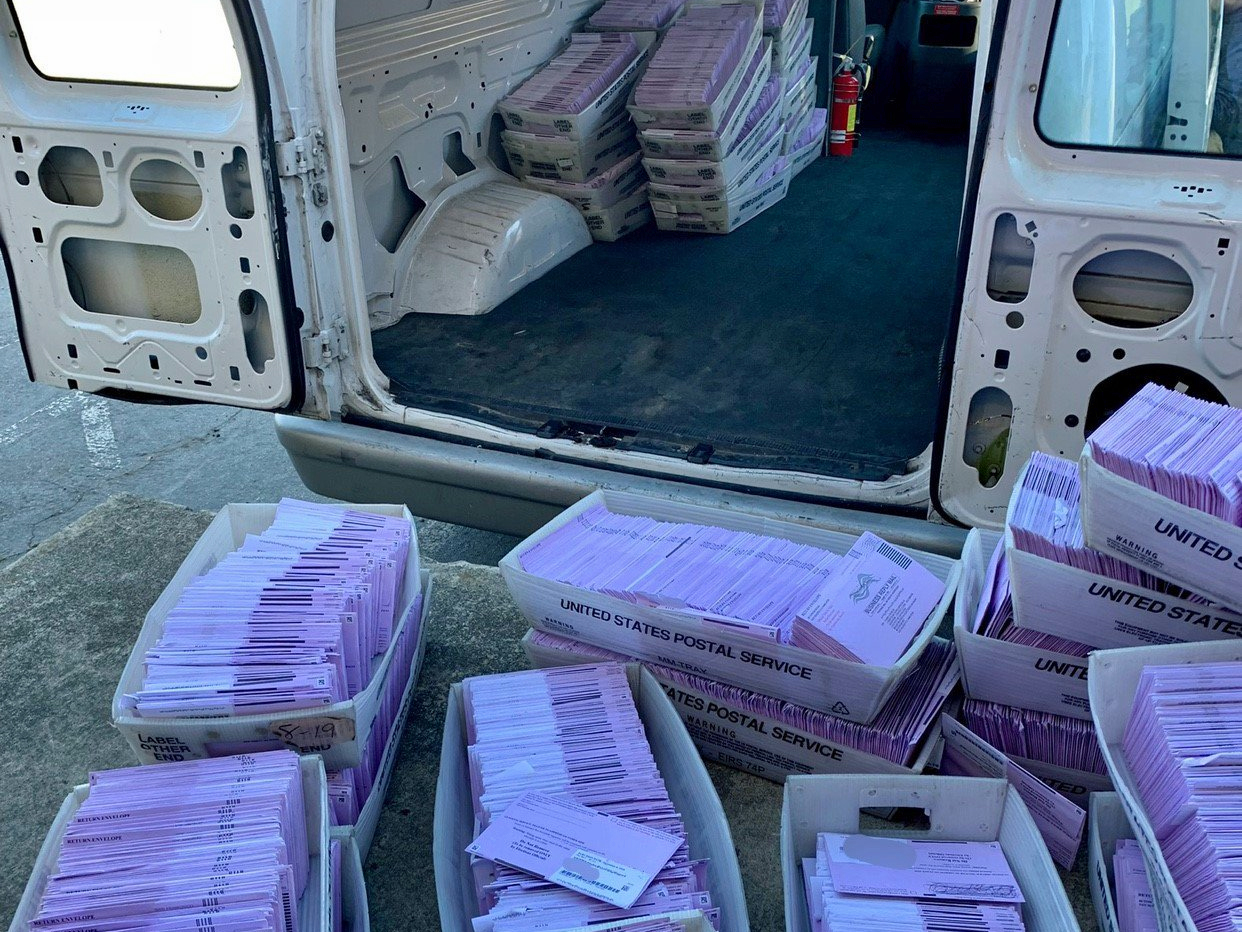Now begins the slow crawl to the finish line.
If all-mail balloting means a bigger turnout – and it looks like it does – it also means a long and protracted post-election in which the outcome of many of the races on Tuesday’s ballot remains still very much up in the air.
In some of the closest races on the Peninsula, it could be three weeks before we know the final results, including the winners of the Redwood City Council race and the passage or defeat of Measure W, the half-cent sales tax to fund transit operations and transportation projects.
On the Peninsula TV Election Night show, Deputy Elections Chief Jim Irizarry said the projected turnout for this election was 191,864 votes. As of last night’s report on the county Elections website, a total of 93,706 votes had been counted.
That means less than half the votes have been counted so far, and, in some races, the results still could change dramatically.
That being said, there were some clear outcomes and some equally clear trends, the most dramatic being a changing of the old guard among Peninsula elected officials, a group suddenly rendered more diverse demographically and in terms of gender.
But the story of the moment is the uncertainty extending into the next few weeks.
In the Redwood City race for three seats, the top three finishers early last night were Vice Mayor Diane Howard, businesswoman Giselle Hale and accountant Rick Hunter. By the end of the evening, Hale had jumped ahead of Howard and Hunter had been supplanted by community advocate Diana Reddy.
The rest of the field stood in this order, as of this morning’s tally: business owner Christina Umhofer, community activist Jason Galisatus and businessman Ernie Schmidt.
Umhofer was still less than 400 votes behind Hunter and less than 500 behind Reddy. It would seem unlikely Umhofer would vault over Hunter and Reddy to land the seat, but with this many votes left to be counted, no one knows for sure.
It is all over for Galisatus and Schmidt, the latter acknowledging as much in a gracious Facebook message this morning.
But for the top four, as Hunter said this morning on Facebook, “It’s going to be a nail biter. … We’ll all just have to hang in there.”
STILL UP IN THE AIR: There are a number of races where the outcome is still quite uncertain, although the outstanding number of ballots to be counted will have to break in a dramatically different way for some folks to come from behind.
The most prominent of these is Measure W, which elicited passionate concern among several elected officials who appeared on Peninsula TV last night.
In need of two-thirds to pass, Measure W began the evening tallies at 64 percent, but slowly crept up to, as of this morning, 66.18 percent.
It is reminiscent of a couple of races on the June ballot, which began the count losing and finished the count scraping past the two-thirds threshold.
Several city council races remain up in the air.
In Daly City, the slate put together by incumbent Ray Buenaventura still could win. Pamela DiGiovanni was in second, but the third member of the slate, Rod Daus-Magbual was 82 votes behind Gabriella Makstman as of this morning.
In Foster City, newcomers Sanjay R. Gehani and Richa Awasthi were in the lead in a race for two seats, but perennial candidate Patrick Sullivan – he has run four times – was only 136 votes shy of his long-desired promised land.
In Pacifica, Sue Beckmeyer and incumbent Mike O’Neill look like secure winners, but Vickie Flores has a tenuous grasp on the third seat. Incumbent John Keener was only 231 votes behind her.
In South San Francisco, incumbent Mark Addiego won easily. Fellow incumbent Pradeep Gupta appeared on his way to losing to newcomers Flor Nicolas and Mark Nagales, but Gupta is only 212 votes behind Nicolas and 171 behind Nagales.
DOWN ON THE GROUND: Even with all the outstanding ballots, some races were definitely decided Tuesday.
In East Palo Alto, newcomer Regina Wallace-Jones and incumbent Ruben Abrica were elected to the Council but long-time incumbent Donna Rutherford was voted off the council.
In Half Moon Bay, Council incumbents Deborah Penrose and Debbie Ruddock were easily re-elected, joined by newcomer Robert Brownstone.
In Millbrae, Council incumbents Reuben Holober and Anne Oliva easily won re-election.
San Carlos elected an entirely new Council majority in a campaign devoid of incumbents: Laura Parmer-Lohan, Sara McDowell and Adam Rak.
NEW FACES: In Menlo Park, district elections dramatically changed the political landscape: Two incumbents, Kirsten Keith and Peter Ohtaki, were defeated by two well-established challengers, Drew Combs and Betsy Nash, with deep roots in the neighborhoods where they were running. With the victory also by Cecilia Taylor, the Menlo Park council shifts from four white and one Asian American councilmembers to a council with two African Americans.
The Menlo Park outcome undoubtedly will send shock waves through other cities that will be forced to take up the issue of elections by district, as incumbents vote on plans that could spell the end of their council tenures.
Not just in Menlo Park, but throughout the ballot, the local elections mirrored the national election in one substantial way: There was an upsurge in the number of women and minorities seeking and winning office.
It was what Congresswoman Anna Eshoo called “The Year of the Woman, 2.0.”
Look, in particular, at the seven school board races on Tuesday’s ballot and you’ll see an unprecedented number of women and minorities who were elected.
The long-term significance of this is that many city council members get their start on a local school board. The bench is deep in San Mateo County.
NOTES, QUOTES AND MOTES ON THE VOTES: It had one of the most low-profile campaigns outside of Brisbane, but the approval of its Measure JJ may have the greatest impact on the region of any measure on Tuesday’s ballot. The proposal amended the city general plan to allow the building of up to 2,200 residential units and 6.5 million square feet of new commercial space on the Baylands portion of the city. It’s a sweeping decision that can make a dent in the region’s jobs/housing imbalance and it’s a credit to the City Council, city leadership and the city’s voters that they took this step.
The Millbrae bond measure to rebuild a community center destroyed by fire was handily defeated, which is likely to force the city to re-think the whole project.
The Jack Hickey era is over on the Sequoia Healthcare District. Elected 16 years ago, Hickey has long advocated for the dissolution of the district. For the first time, the board members were elected by district. Hickey put together a slate of candidates and all of them lost, including Hickey. Maybe this will bring an end to his advocacy to end the district, but Hickey doesn’t let a little thing like defeat deter him.
On the San Mateo County Harbor District, Sabrina Brennan, not on the ballot, won two allies in Ed Larenas, who was re-elected, and Nancy Reyering. They now control the majority of that commission. It’s always hard to tell what Brennan’s long-term goals are for the district, but she is a disruptive force. This turn of events could hasten the efforts of her critics to dissolve the district and turn it into a county department.
All the measures on Tuesday’s ballot to tax cannabis were approved. That was not the fate for four advisory measures in Half Moon Bay that would have signaled to the City Council to go forward with allowing sale and production of marijuana in town. All four lost.
And in Redwood City, voters easily approved a measure to increase the local sales tax that would cover a budget shortfall induced by pension obligations.
But the theme of this election was and, for the foreseeable future continues to be, uncertainty.
It’s all over but the counting, and the counting is going to take some time.
Contact Mark Simon at mark.simon24@yahoo.com.
Photo of county ballots being picked up from USPS shared by the San Mateo County Elections Division.
*The opinions expressed in this column are the author’s own and do not necessarily reflect the views of Climate Online.






